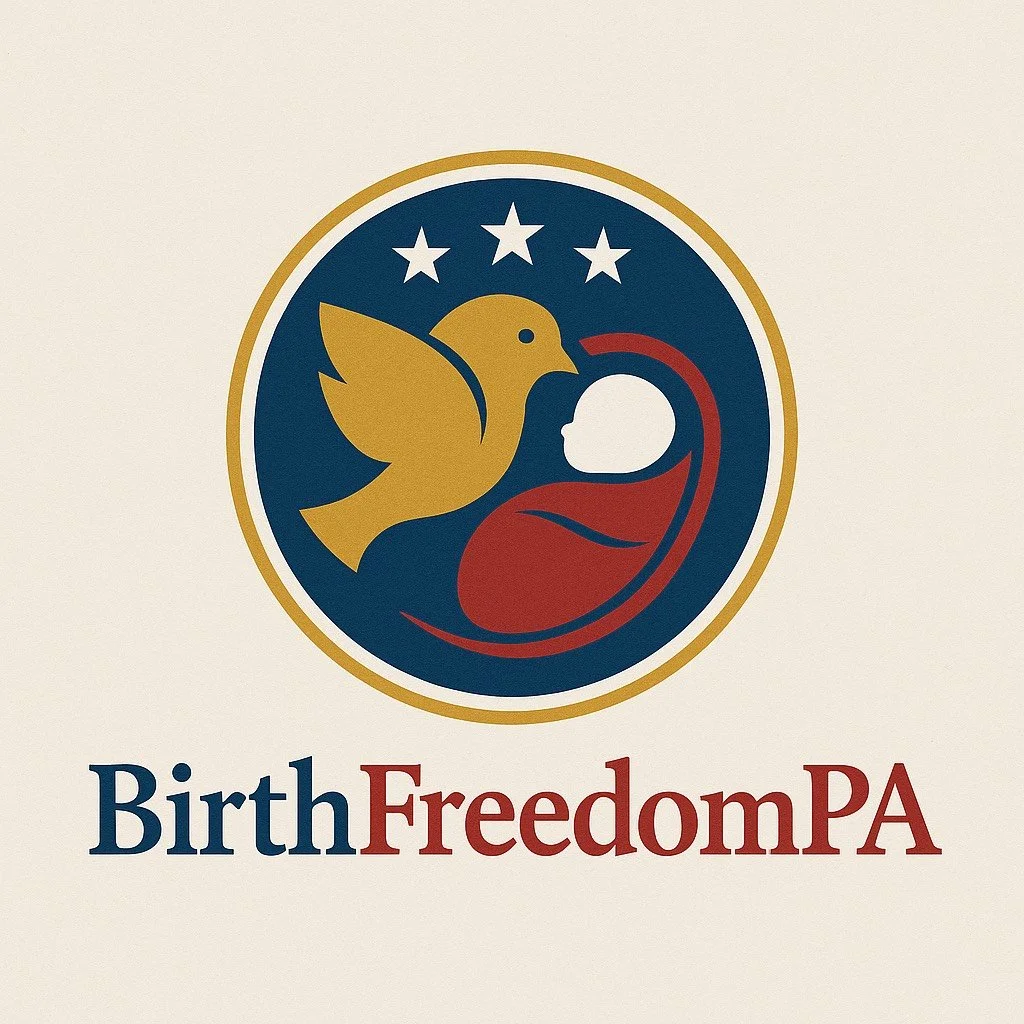BFPA Official Position on SB507
Birth Freedom PA Official Position Statement on SB 507
Birth Freedom PA is founded to unite and support all types of midwifery groups, with the ultimate goal of protecting families’ right to choose their care providers and place of birth in the Commonwealth.
Birth Freedom PA affirms our support for Senate Bill 507. This legislation increases access to Certified Midwives within the medical midwifery model without impacting traditional or Direct-entry Midwives in Pennsylvania. Families will continue to have the right to choose the provider and model of care that best serves their needs.
SB 507 amends the Medical Practice Act of 1985.
This amendment introduces licensure in Pennsylvania for Certified Midwives (CMs), trained at Thomas Jefferson University. Acceptance of the amendment allows CMs to practice in Pennsylvania medical facilities beyond residency, expanding access to midwifery care.
Increasing the number of midwives in hospitals will improve patient-to-midwife ratios and enable more midwife-led maternity care teams. Research shows that midwife-led care leads to fewer interventions such as inductions, epidurals, and episiotomies, while increasing rates of vaginal birth. It is also associated with reduced preterm births, lower NICU admissions, fewer infant deaths, and decreased overall medical costs. Beyond these measurable outcomes, patients consistently report greater satisfaction with midwife-led care because it offers more continuity, personalized attention, and emotional support throughout the maternity experience.
The bill explicitly states it does not regulate lay midwives, direct-entry midwives, or other unlicensed birth workers:
“Nothing in this act shall be construed to authorize or prohibit the practice of lay midwives, direct-entry midwives or other unlicensed birth workers who do not hold a license under this act. A lay midwife, direct-entry midwife or other unlicensed birth worker who does not hold a license under this act shall not be considered licensed or regulated by the Commonwealth.”
Birth Freedom PA stands with consumers and the midwifery community for autonomy, informed choice, and unity across all midwifery models of care.
Resources:
For more information about this amendment:
https://www.palegis.us/senate/co-sponsorship/memo?memoID=43833&document=SB507
If you have any questions or suggestions regarding this legislation, please contact Christine Zubeck at 717-787-6123 or czubeck@pasen.gov.
You may reach out to Senator Pat Stefano, Chair, or another member of the Consumer Protection and Professional Licensure Committee
https://consumer.pasenategop.com/committee-members/
Contact your senator to discuss your support of SB 507:
https://www.palegis.us/find-my-legislator
Research regarding midwife-led maternity care:
https://obgyn.onlinelibrary.wiley.com/doi/10.1111/1471-0528.18346?af=
https://pubmed.ncbi.nlm.nih.gov/39597773/
https://bmcpregnancychildbirth.biomedcentral.com/articles/10.1186/s12884-023-05664-9
Types of midwives; training and scope of practice:
Https://www.birthfreedompa.org/public-announcements
The Five Types of Midwives
Throughout history, midwives have helped women through pregnancy and childbirth. Today, five types of midwives provide varying levels of care to women and newborn babies:
Medically trained midwives:
Certified Nurse-Midwife (CNM)
Certified Midwife (CM)
Direct-entry midwives: trained and certified
Certified Direct Entry Midwife (CDEM)
Certified Professional Midwife (CPM)
Lay Midwife/Traditional Midwife
Medically Trained Midwives
Certified Nurse-Midwife (CNM) and Certified Midwife (CM)
Certified Nurse-Midwives (CNMs) and Certified Midwives (CMs) are highly trained healthcare professionals who provide comprehensive care for women, not only during pregnancy and childbirth, but also throughout adolescence, pregnancy, childbirth, and the postpartum period, as well as into the end of life.
CNMs are nurses who have completed a graduate-level nurse-midwife program and passed a certification exam from the American Midwifery Certification Board. At the same time, CMs are non-nurses who have completed a graduate-level midwifery degree program and passed a certification exam from the American Midwifery Certification Board.
CNMs and CMs are qualified to provide the same level of care. All states license CNMs for independent practice, but not all states permit CMs. The American College of Nurse Midwives reports that CNMs and CMs attended 312,129 births in the U.S. in 2010, representing 11.6% of all vaginal births and 7.8% of total births.
Direct-entry Midwives
Certified Direct-Entry Midwife (CDEM)
A Certified Direct Entry Midwife (CDEM) is a professional midwife who has completed a structured course of education, clinical training, and demonstrated competencies in the care of childbearing women and their newborns. Unlike nurse-midwives, CDEMs are not required to hold a nursing degree; their training pathway is a direct-entry program, meaning they enter midwifery without first becoming nurses.
The CDEM credential is conferred by the National Fellowship of Direct Entry Midwives (NFDEM) to midwives who meet defined educational, clinical, and proficiency standards, ensuring they are skilled, accountable providers for families choosing home birth or other out-of-hospital birth settings. A candidate qualifies to become a CDEM by completing the NFDEM Proficiency Program, including a structured education program, fulfilling hands-on clinical training requirements, demonstrating proficiency in midwifery skills and emergency response, completing the NFDEM credentialing process, and passing the CDEM written examination. Once certified, a CDEM must engage in ongoing professional development and peer review to maintain certification.
The NFDEM is currently pursuing accreditation through the NCCA. The CDEM practice privileges are limited to unregulated states as of September 2025.
Certified Professional Midwife (CPM)
A Certified Professional Midwife (CPM) has met the certification requirements of the North American Registry of Midwives (NARM). Applicants can qualify to take the NARM exam by either apprenticing with a qualified midwife and completing an Entry-Level Portfolio Evaluation Process or graduating from a midwifery program or school. If the Midwifery Education Accreditation Council doesn’t accredit the program or school, applicants must complete the Entry-Level Portfolio Evaluation Program.
The practice privileges of CPMs vary by state.
Both CDEMs and CPMs are committed to providing the Midwives Model of Care:
Monitoring a woman’s complete (not just physical) well-being from pre-natal through post-natal
Identifying women who need to see an obstetrician and giving them appropriate referrals
Giving each mother individualized education, counseling, and prenatal care, assisting during labor and delivery, and supporting the mother and newborn after the birth
Using as few technological interventions as possible
Lay Midwife
A lay midwife, also known as a traditional midwife, refers to an uncertified or unlicensed midwife, practicing within the Midwifery Model of Care, who often has an informal education, such as an apprenticeship or self-study, rather than a formal education. Some states have licensing requirements for lay midwives, while others don’t.
